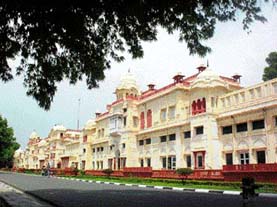|
IN FOCUS
Coaching troubles
Ravi Dhaliwal

A view of Netaji Subash National Institute of Sports, Patiala.
— Photo by the writer |
THE
Netaji Subash National Institute of Sports (NSNIS), Patiala, was set up
in 1961 with the prime objective of producing top drawer coaches through
its Diploma in Sports Coaching (DSC) course. Besides, the institute
aimed to provide infrastructure to sportsmen attending national camps so
that they could be exposed to the state-of-the-art training methods.
About a decade ago, the
main aim of the NIS aims was virtually sidelined when, at the behest of
certain vested interests, the duration of the nine-month-long DSC course
was suddenly increased to two years, virtually diluting its impact. That
later the authorities thought it prudent to again decrease it to one
year only showed that a hit-and-trial method was being adopted to arrive
at the right course period.
The result: aspiring
coaches started staying away. Statistics reveal that in 1997-98, just 58
students turned up for the DSC. However, the situation was redeemed by a
handful of local officers who put the establishment's interest ahead of
their own.
Gradually, the
organisation has once again found its feet. This year, the number of
diploma holders passing out has risen to 214 in as many as 19
disciplines. Now, the DSC is attracting students like never before and
other courses like M.Sc in sports coaching, the postgraduate Diploma in
Sports Medicine and refresher courses are also attracting students from
every nook and corner of the country.
The SAI's ban on
recruitment of coaches has not had much of an impact as most of the
diploma students come here from the police, the services, Railways, SAIL
and P&T Departments. Once they pass out they are absorbed as coaches
in their respective departments.
One problem area that
needs immediate attention is the ad-hocism in the management of the
centre. Most SAI officers perceive the top post at the NIS, that of ED
(Academics), as a punishment. At present, the institute is being headed
by an IPS officer, B.K Sinha, who is also the Secretary of the SAI.
Since 1998, the centre has had five EDs, out of which four held this
post in addition to duties in the SAI's Delhi office

|
